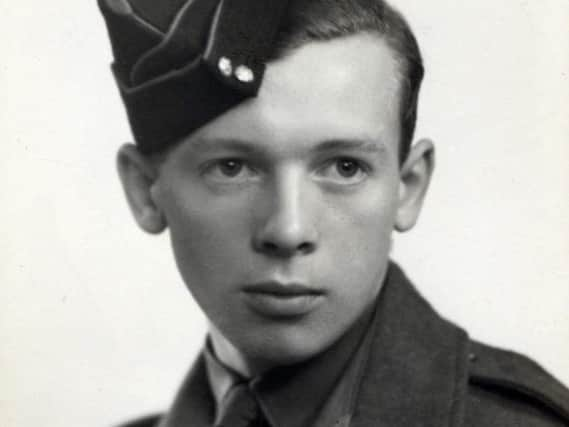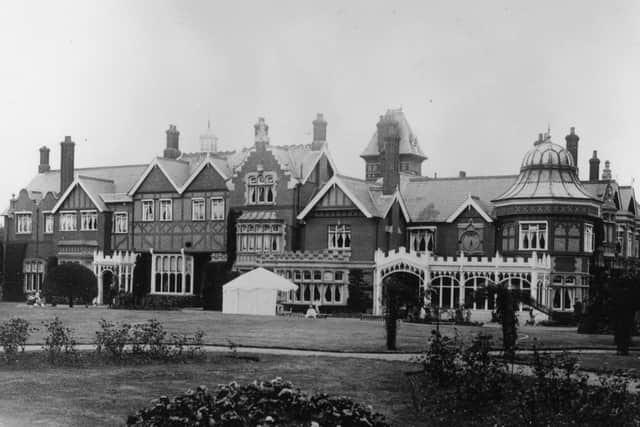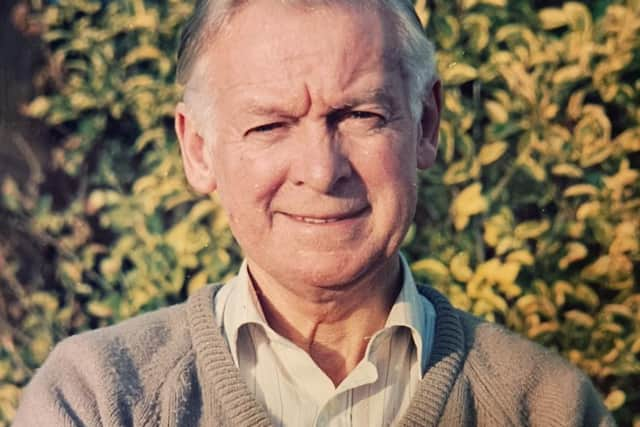Honouring Blackpool code-cracking hero who used Morse Code to send wartime messages


A code cracking Bletchley Park war hero from Blackpool who sent vital information to British agents working behind enemy lines has inspired his grandson to tackle an extreme fitness challenge and raise funds for research into dementia.
Teacher Ed Brindley, 29, will swim 2.4 miles, cycle 112 miles then run a 26.2 mile marathon on Sunday in the challenging Outlaw Triathlon in Nottingham.
Advertisement
Hide AdAdvertisement
Hide AdHe’s aiming to raise at least £1,000 for Alzheimer’s Research UK, as his beloved grandfather Charles, former head of security at Blackpool Tower and Winter Gardens, suffered from dementia in his final years.


Ed grew up unaware that during World War II Charles was a Royal Signalman linked to Bletchley Park, home to the Colossus and Enigma machines.
Charles was picked to join the elite Special Communications Unit Number 1 at Whaddon Hall, Bletchley - HQ for MI6’s section VIII operations during the war and the forerunner of today’s secret service.
He was responsible for supplying crucial details on German strategy to Allied commanders and agents in the field. Code-named Ultra, the information was credited as helping to end the conflict early.
Advertisement
Hide AdAdvertisement
Hide AdCharles later served in Palestine, probably transmitting secret encoded signals using morse code. After being demobbed he worked in Preston for the English Electricity Company, which made electrical equipment, before returning to his home town of Blackpool where he became head of security at Blackpool Winter Gardens, Opera House and Tower in the 1970s and 80s.


He was responsible for shielding stars of the day from over-zealous fans plus protecting politicians from potential IRA attacks.
Ed, who teaches PE at Formby High School, said: “We didn’t know anything about my grandad’s work at Bletchley Park until his mum’s diary was discovered. It was amazing to learn what Grandad did in the war - he never spoke about it to my dad Noel, his other son Russell nor their sister Elaine.
“I assume he had been ordered to keep it a secret.
“Grandad’s brother Tommy would have known about the Bletchley link but the paperwork was hidden away and forgotten.


Advertisement
Hide AdAdvertisement
Hide Ad“He was also in the Services and joined the Royal Navy though he didn’t have to, as he had a protected job working on Lancashire Wellington bombers.
“It’s surprising they signed up - they weren’t conscripted - as their own father Thomas was bayonetted and gassed in World War I, and had a trench collapse on him.
“He had served in France in the Dorset Reserve Cavalry - made famous in the stage play and film War Horse - and in Galipolli.
“I remember Grandad as somebody who was always playful and a lot of fun, enjoying games with us in his garden, where he had lots of odd things he’d found on the beach.
Advertisement
Hide AdAdvertisement
Hide Ad“The first time I realised how bad dementia could be was when I saw grandad flick from anger to confusion to sadness, unable to recognise us when me and Dad visited him in hospital for the last time. He was swearing and just not the man I knew - he never swore.
“He was younger than I am now when he was sending those secret messages, doing a job that involved a high level of accuracy and skill. It is tragic that dementia took away those abilities and turned him into a different person.”
He died in July 2007 aged 80 and it was only after Tommy’s death that the family discovered this secret history.
Finding out about his work in the war was amazing for his family. Charles and Tommy’s mum Hannah kept a diary detailing where her sons were, from their letters home. Charles could say he was in Bletchley as nobody would know what was going on there, and Tommy simply said which ship he was on, rather than his location.
Advertisement
Hide AdAdvertisement
Hide AdIt was only after reading the diary after his death that the family discovered their Grandad was at Windy Ridge, a wireless station at Whaddon Hall, named Station X in 1939, which was linked to Bletchley Park.
“Dad did some research and found out Grandad passed encoded messages to high-ranking officers and spies in the field in Europe to inform them of German operations,” said Ed, “which had been discovered by the teams cracking the German transmissions.
“He’s also on the Bletchley role of honour, which you can see when you go into the museum there and online.
“He used Morse Code to send the encrypted messages and had to be very accurate, especially when it came to numbers and dates.
Advertisement
Hide AdAdvertisement
Hide Ad“He probably had no idea about the content of what he was sending as this too would have been encoded. There were thousands working there, decoding messages, encrypting the intelligence into new messages and transmitting these onwards.
“Dad said that when they were children and asked him about his time in the war he just said ‘That’s for me to know and you to find out.” Well, we’ve now found out but sadly we can’t tell Grandad that we now know.
Charles went on to be head of security at Blackpool Winter Gardens and Tower, and his son remembered they had a phone line installed at home in the 70s because the Tower repeatedly got IRA bomb scares. “Grandad would have to get out of bed in the night and go down to check the place was safe,” said Ed, “plus Dad got free tickets to see bands but he had to help out as a bouncer!” Fitness fan Ed has been eating up to 7,000 calories a day during his training and reckons he will burn more than 15,000 calories during the triple event.
“I use protein shakes and eat plenty of pulses and vegetables as I don’t eat meat. Plus a lot of doughnuts and Jaffa cakes,” he added. Donations can be made at Ed’s Just Giving page https://bit.ly/2Qnw7hu
Comment Guidelines
National World encourages reader discussion on our stories. User feedback, insights and back-and-forth exchanges add a rich layer of context to reporting. Please review our Community Guidelines before commenting.